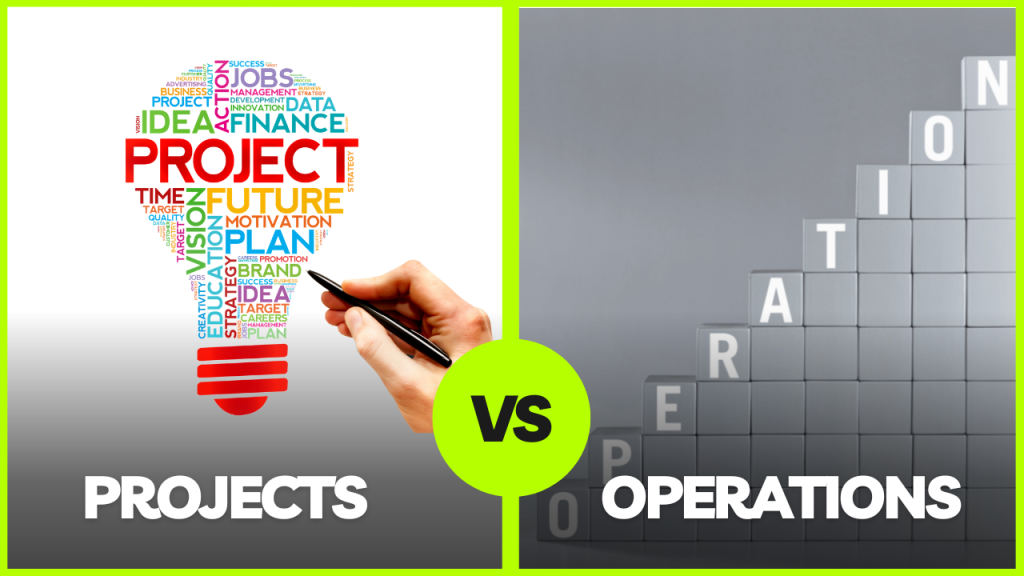Projects vs. Operations: The Differences

Table of Contents
Have you ever wondered why some companies prioritize projects over operations (Projects vs. Operations) while others do the opposite? It’s a question that has perplexed business leaders for years.
It is vital to understand the differences between projects and operations as a project manager, operations manager, or any professional while delivering project outcomes.
Projects and operations are two sides of the same coin but require very different approaches. Both are vital for business success, but they involve different approaches, methodologies, and outcomes.
That’s why it’s crucial to understand the differences between projects and operations, and how they impact your business process management and market demand.
This article aims to highlight the main differences between projects and operations, their importance in business, and how project management and operations management contribute to improving organizational efficiency.
Projects vs. Operations – Definitions and Characteristics
The PMI’s ‘Project’ definition states,
A project is a temporary endeavor undertaken to create a unique product, service, or result. The temporary nature of projects indicates a beginning and an end to the project work or a phase of the project work. Projects can stand alone or be part of a program or portfolio.
- Source: Glossary of Project Management Institute, A Guide to the Project Management Body of Knowledge Seventh Edition AND The Standard for project Management ANSI/PMI 99-001-2021)
On the other hand, operations refer to the ongoing execution of activities that are essential for business processes, such as mass production, billing, maintenance, selling, and backup, to name a few. Operations are ongoing and repetitive, and their purpose is to maintain the business’s status quo and meet market demand.
The key characteristics that differentiate projects from operations are their objectives, duration, and complexity. Projects have a defined start and end date, and a unique goal and require a project team’s effort and coordination to produce a unique product, service, or result.
In contrast, Operations are ongoing and do not have a specific end date. Operations keep the business running smoothly and efficiently. They are often routine and require little or no project management.
Why Understanding the Differences Between Projects and Operations Matters (Projects vs. Operations)
Understanding the differences between projects and operations is essential because they require different management approaches.
Project management focuses on planning and executing projects within a specific timeframe and budget. A project manager oversees the project team and ensures the project is on time, and within budget. In project management, you can follow guides (such as PMBOK) and other project management methodologies to ensure that the project runs smoothly from start to finish.
On the other hand, operations management focuses on ensuring that the business runs smoothly and efficiently.
Operations managers oversee the business’s day-to-day activities and ensure they are executed efficiently.
They use operations management methodologies to optimize the business process and improve productivity. Operations management ensures that the business can meet market demand and remain competitive.
How Project Management and Operations Management Work Together
Project management and operations management work together to create unique products, services, or results that meet market demand. Project management focuses on creating a temporary endeavor to produce a unique product, service, or result.
Operations management optimizes the business process to ensure that the unique product, service, or result is produced efficiently and meets market demand.
Understanding the Difference between Projects and Operations
One way to understand the difference between projects and operations is to think of a farmer planting crops.
Planting crops is an ongoing operation that requires repetitive actions. For example, preparing the soil, planting the seeds, watering and fertilizing the plants, and harvesting the crops. This process is repeated every season, aiming to produce a consistent yield to meet market demand.
On the other hand, imagine that the farmer wants to expand their business. He decides to build a greenhouse to grow a new and unique crop that they can sell at a premium price. This would be a project, a temporary endeavor undertaken to create a unique product or result.
The project would have a specific start and end date. This project also involves a team of people with specialized skills who work together to successfully plan, execute, and complete the project.
Just as the farmer’s ongoing operations keep their business running and meet market demand, the greenhouse project is a unique and temporary endeavor with a specific goal, timeline, and budget.
Once the greenhouse is built, and the new crop is being grown, it becomes part of the ongoing operations of the business.
Final Thoughts
In conclusion, understanding the differences between projects and operations is crucial for the success of your organization.
Project management and operations management work together to create unique products, services, or results that meet market demand.
By using project management and operations management methodologies, you can ensure that your organization can deliver high-quality products, services, or results on time and within budget.
Link to Related Article: If you want to learn more about maximizing business efficiency through organizational systems, check out my related article: Organizational Systems: Maximizing Business Efficiency




